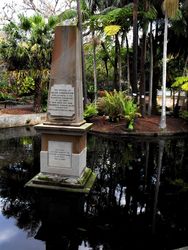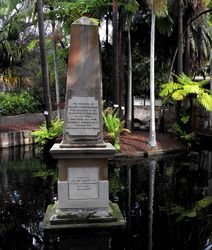
Home » Themes » People » Exploration
Allan CunninghamPrint Page 
The monument commemorates explorer and botanist Allan Cunningham whose remains were removed from the Devonshire Street Cemetery and placed within the obelisk on the 25th May 1901.
Allan Cunningham became a member of that elite group of people who explored the eastern part of Australia in the eighteen hundreds. Early in his Australian adventures, he joined John Oxley and Philip Parker King in several explorations. He assisted with all sorts of discoveries both botanical and geographical. Later he became an explorer and his most famous geographic discovery was the Darling Downs.
He was one of the most important early collectors of Australian plants, working for Sir Joseph Banks back in London and, in 1817, he began the first of four sea voyages with Phillip Parker King to survey the whole of the Australian coastline. He also collected plants in inland New South Wales and south-eastern Queensland and collected some of the oldest trees growing in the Royal Botanic Gardens.
He died in 1839 (aged 47) and was buried in the Devonshire Street Cemetery, where Central Station now stands. His remains were moved in 1901 to the obelisk in the pond by the Gardens Restaurant and his tombstone is mounted on the wall of the National Herbarium of New South Wales just outside Reception.
The plants in the garden beds surrounding the obelisk pond are examples of those collected by Cunningham from the Illawarra between 1818 and 1822.
Visitors to the Botanic Gardens are the "S.M. Herald" says, familiar with an obelisk in memory of Allan Cunningham, the distinguished botanist and explorer, who for a time was superintendent of the Botanic Gardens. The monument was erected by some of his admirers in the year 1844. He had been buried in the Devonshire street cemetery five years previously, and the recent opening of his brick grave brought to light a piece of the skull, about four inches in diameter, a piece of the large bone of the arm, and some other fragments.
These were placed in a leaden casket 10 inches long, five inches broad, and four inches deep, which was inserted in an excavation made in the upper portion of the obelisk, and the whole covered with a marble slab, which bears the following inscription in leaden lettering " The remains of Allan Cunningham were interred in the Devonshire street Cemetery in July, 1839, from which they were reverently removed on the 25th May, 1901 placed within this obelisk." The placing in the obelisk took placed on 26th June ultimo.
Wagga Wagga Advertiser (NSW), 2 July 1901.
Location
| Address: | Mrs Macquaries Road, Royal Botanic Gardens, Sydney, 2000 |
|---|---|
| State: | NSW |
| Area: | AUS |
| GPS Coordinates: | Lat: -33.865103 Long: 151.219226 Note: GPS Coordinates are approximate. |
Details
| Monument Type: | Monument |
|---|---|
| Monument Theme: | People |
| Sub-Theme: | Exploration |
Dedication
| Approx. Monument Dedication Date: | 1844 |
|---|
Plaque:
The Remains Of
ALLAN CUNNINGHAM
Were Interred In The
Devonshire Street Cemetery
In July 1839
From Which They Were
Reverently Removed On The
25th May 1901
And Placed Within This Obelisk.
Plaque:
Erected
To The Memory Of
Allan Cunningham
Botanist
MDCCCXLIV





